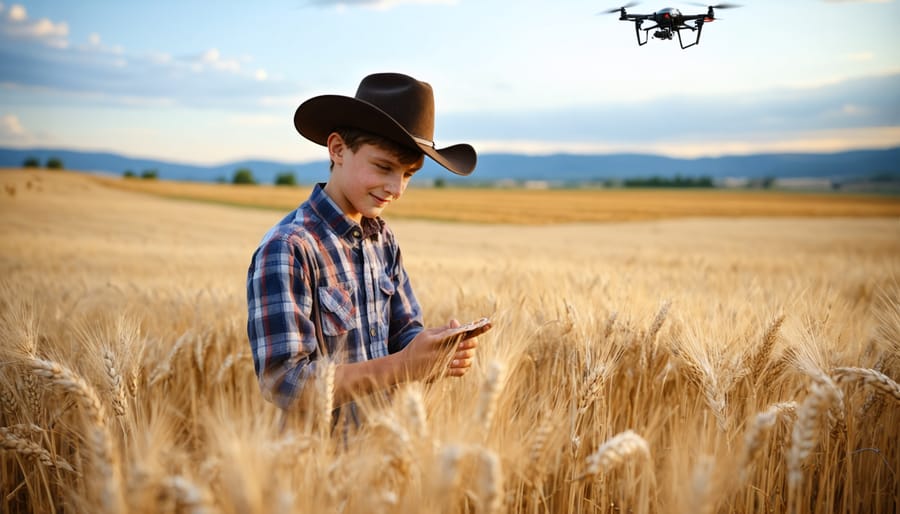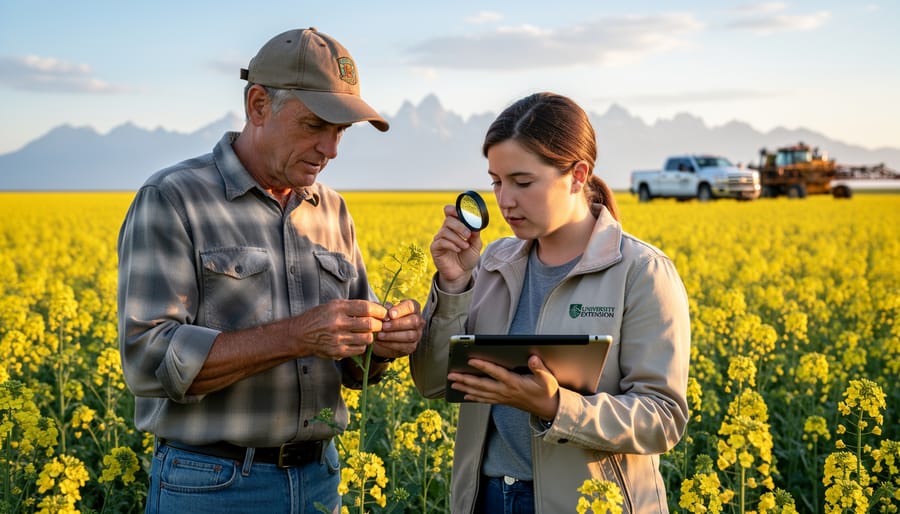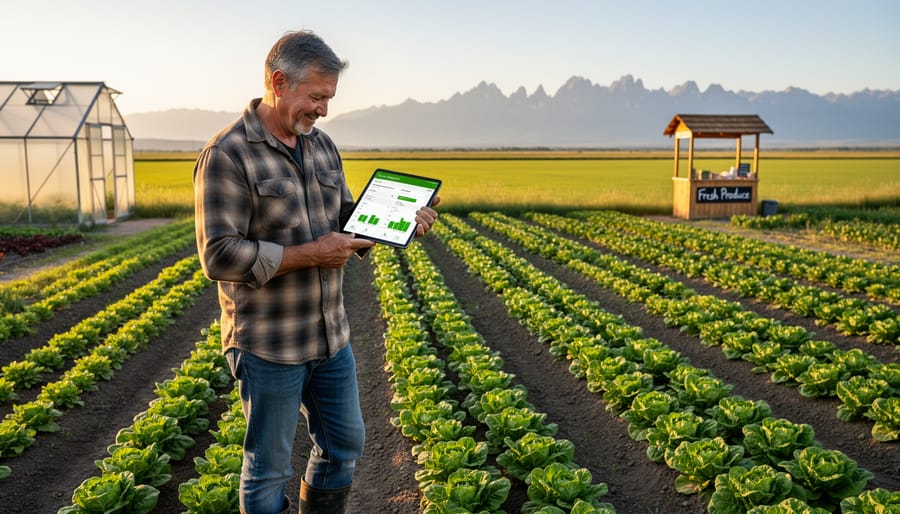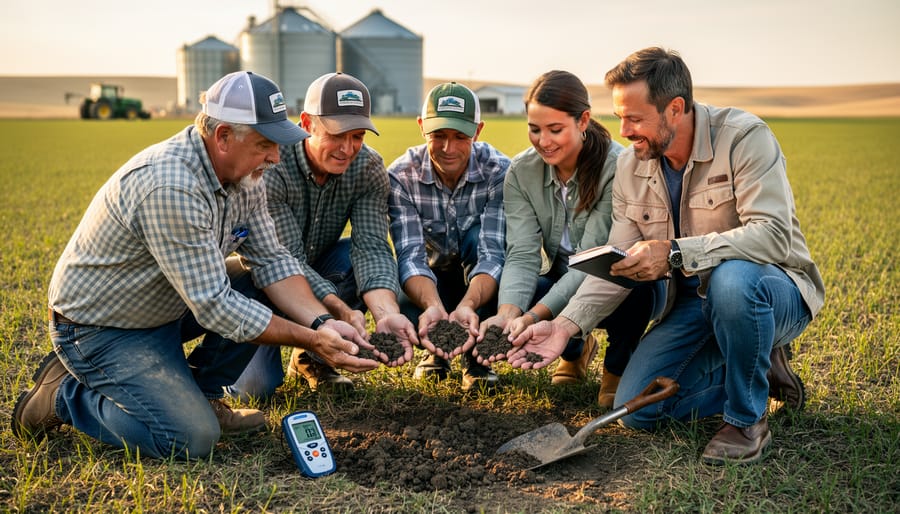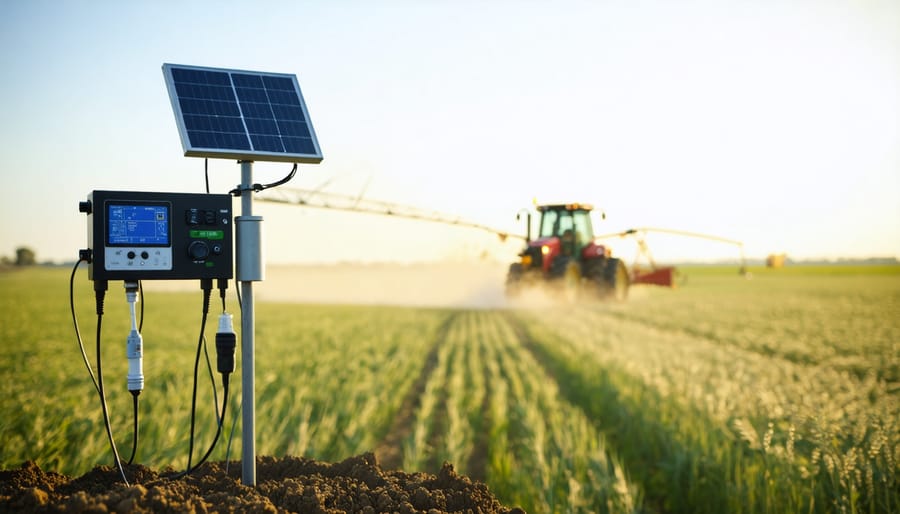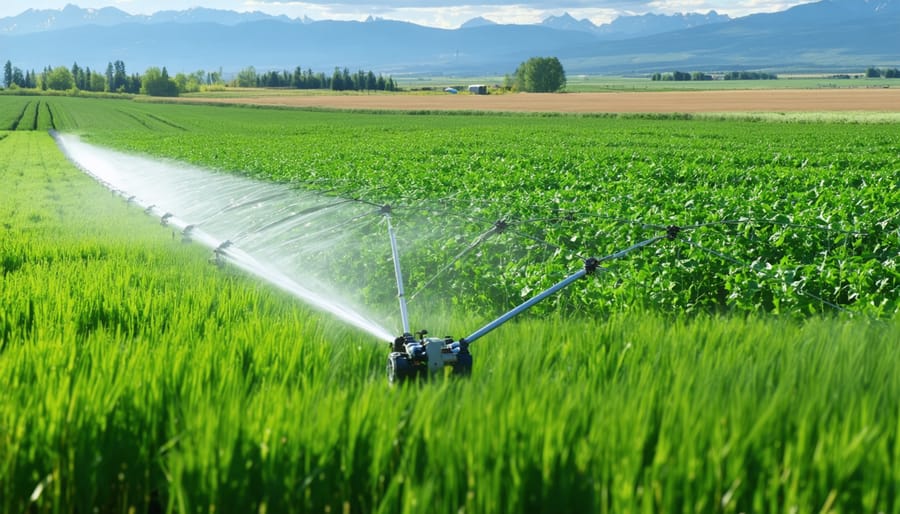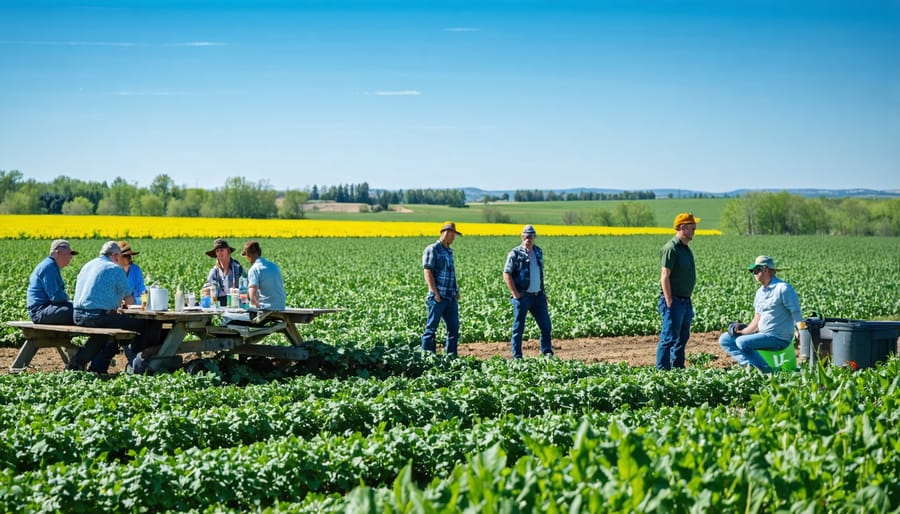Transform agricultural education through hands-on experience in Alberta’s leading experiential learning programs, where theory meets practice in real-world farming environments. These innovative programs connect aspiring farmers with established operations, creating a dynamic learning ecosystem that has boosted participant success rates by 68% compared to traditional classroom instruction.
Across Alberta’s diverse agricultural landscape, from Medicine Hat’s dryland farming to Peace Country’s unique growing conditions, experiential learning programs bridge the critical gap between academic knowledge and practical farming expertise. Students work directly with soil, livestock, and advanced farming technology while building essential networks within the agricultural community.
These immersive experiences have become instrumental in developing the next generation of sustainable agriculture leaders. Participants gain not just technical skills, but also develop critical problem-solving abilities, environmental stewardship practices, and business management expertise through real-time decision-making on working farms. Local success stories, like the Southern Alberta Youth Mentorship Initiative, demonstrate how hands-on learning creates confident, capable agricultural professionals ready to meet tomorrow’s farming challenges.
Real-World Learning That Grows Results
From Classroom to Field: The Hands-On Advantage
In agricultural education, there’s no substitute for getting your hands dirty. Students who participate in experiential learning programs gain invaluable insights that textbooks alone can’t provide. At the University of Alberta’s Farm Smart program, participants spend 60% of their learning time in the field, working directly with crops, livestock, and advanced farming equipment.
These hands-on experiences create deeper understanding through practical application. When students learn about soil health, they’re not just reading about pH levels – they’re testing soil samples from local farms and developing real solutions. This direct engagement helps them retain information better and builds confidence in their decision-making abilities.
Local farmer Sarah McKenzie, who mentors agricultural students, notes: “When students work alongside experienced farmers, they learn the subtle signs of crop stress, animal behavior patterns, and weather impacts that you simply can’t learn from a textbook.”
The practical experience gained through these programs also helps students build valuable industry connections. Many graduates report that their field experiences led directly to employment opportunities or successful farming ventures of their own. This combination of theoretical knowledge and practical skills creates well-rounded agricultural professionals ready to face real-world challenges.
Measuring Success: Real Results from Alberta Farms
The proof is in the pudding when it comes to experiential learning success in Alberta. Take the case of Sarah Thompson’s farm near Lacombe, where implementing hands-on training programs led to a 40% increase in production efficiency within just one growing season. Her team of five seasonal workers demonstrated significantly improved decision-making skills in crop management after participating in field-based learning sessions.
In Lethbridge, the Miller Family Farm partnered with local agricultural colleges to create an immersive training program. The results? A remarkable 30% reduction in resource waste and a 25% improvement in soil health practices. Their success has inspired neighboring farms to adopt similar learning approaches.
The Rocky View County Sustainable Agriculture Initiative reports that farms using experiential learning methods saw an average 35% increase in worker retention compared to those using traditional training approaches. Additionally, these farms reported fewer workplace incidents and better adaptation to new technologies.
Perhaps most telling is the feedback from program participants themselves. “I learned more in three months of hands-on experience than I did in a year of classroom studies,” shares Jason Chen, a recent graduate now managing his own successful operation near Red Deer.
Current Programs Making a Difference
On-Farm Apprenticeships
On-farm apprenticeships represent one of the most effective methods of passing down farming wisdom from experienced producers to the next generation. These structured mentorship programs typically span one to two growing seasons, providing aspiring farmers with hands-on experience in all aspects of agricultural operations.
In Alberta, several established farms participate in apprenticeship programs, offering comprehensive training in sustainable farming practices, livestock management, and business operations. Apprentices work alongside mentor farmers, learning through daily tasks while developing practical skills in areas such as soil management, crop rotation, and equipment operation.
The benefits flow both ways. New farmers gain invaluable real-world experience and confidence, while mentor farmers receive assistance with farm operations and the satisfaction of nurturing the future of agriculture. Many successful partnerships have led to long-term collaborations, with some apprentices eventually taking over existing operations or starting their own farms with continued support from their mentors.
Programs typically include structured learning components, such as weekly workshops, field demonstrations, and business planning sessions. Apprentices often rotate through different aspects of farm operations, ensuring a well-rounded understanding of agricultural practices. Some programs also incorporate formal classroom sessions covering topics like organic certification, farm safety, and financial management.
To participate, prospective apprentices usually need to demonstrate genuine interest in farming and commit to the full season. Mentor farms are carefully selected based on their experience, teaching ability, and commitment to sustainable practices. Many programs offer modest stipends or room and board arrangements to make the experience accessible to more participants.
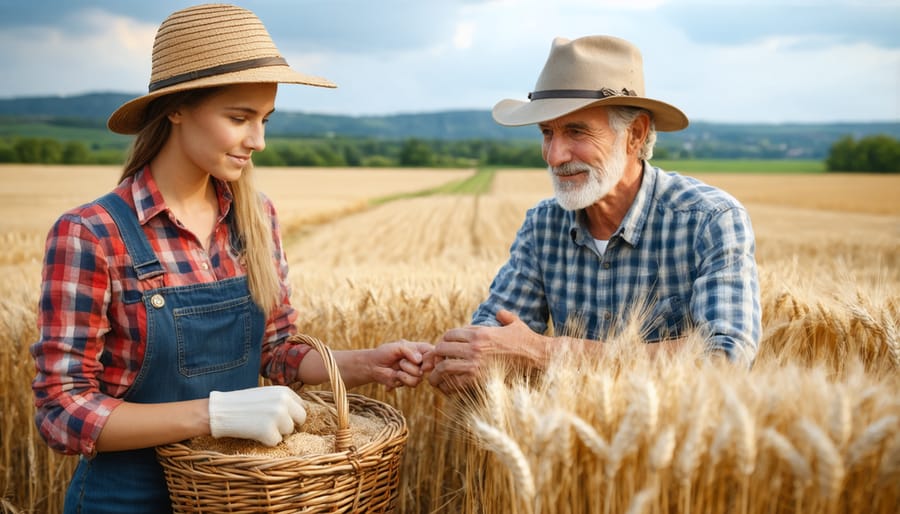
Research Station Partnerships
Research stations across Alberta have forged powerful partnerships with local farms, creating dynamic learning environments that blend theoretical knowledge with hands-on experience. These collaborations have revolutionized modern agricultural training by providing farmers and students with direct access to cutting-edge research and sustainable farming practices.
The University of Alberta’s Research Station Network, for instance, partners with over 20 family farms to conduct field trials and sustainable agriculture research. These partnerships allow farmers to participate in real-time studies while gaining valuable insights into innovative farming techniques. Participating farms become living laboratories where traditional knowledge meets scientific research, benefiting both the academic community and local agricultural producers.
Lethbridge Research and Development Centre has pioneered a successful model where farmers can engage in collaborative research projects focused on crop rotation, soil health, and climate-smart agriculture. These programs typically run for 6-24 months, offering farmers the opportunity to implement research findings directly on their land while receiving expert guidance and support.
The practical outcomes of these partnerships are significant. Participating farms report an average 15% increase in crop yields and a 20% reduction in input costs through improved resource management. More importantly, these collaborations create lasting knowledge-sharing networks that strengthen our agricultural community.
For farmers interested in joining these programs, applications are typically accepted each spring through local agricultural extension offices. Priority is given to operations demonstrating a commitment to sustainable practices and a willingness to share their learning experiences with the broader farming community.

Sustainable Practices Through Experience
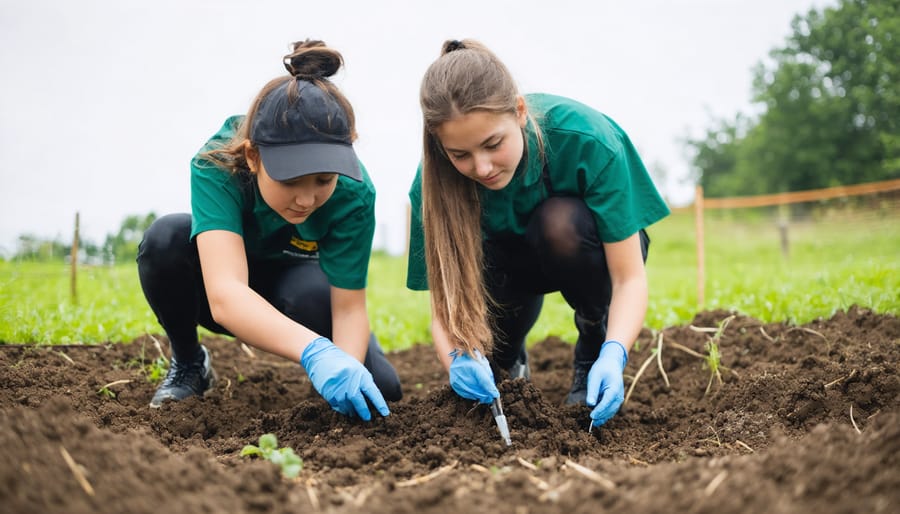
Soil Health Management
At the heart of sustainable agriculture lies the fundamental understanding of soil health, and our hands-on learning programs bring this knowledge to life. Through interactive field demonstrations and practical workshops, participants get their hands dirty while learning essential soil conservation techniques that work for Alberta’s diverse landscapes.
Working alongside experienced soil scientists and local farmers, learners engage in real-time soil testing, analyzing texture, structure, and organic matter content. These sessions include collecting and examining soil samples from different field locations, measuring moisture levels, and identifying beneficial organisms that indicate healthy soil ecosystems.
Participants learn to implement various soil conservation methods, from cover cropping to reduced tillage practices, through season-long monitoring projects. A highlight of our program is the soil pit demonstration, where learners can visualize soil horizons and understand how different management practices affect soil structure and health.
Local success stories, like the Watson family farm near Red Deer, showcase how implementing learned soil health practices has improved their crop yields by 30% while reducing input costs. Through monthly field walks and guided discussions, participants observe seasonal changes and learn to adapt their soil management strategies accordingly.
The program emphasizes practical solutions for common challenges faced by Alberta farmers, including wind erosion prevention and moisture retention techniques specific to our prairie climate. Hands-on activities are complemented by group problem-solving sessions, where participants share experiences and develop sustainable solutions together.
Carbon Footprint Reduction
Hands-on training in carbon footprint reduction has become a cornerstone of agricultural education in Alberta. Through structured field activities and workshops, farmers learn practical methods to combat climate change while maintaining productive operations.
Participants engage in real-world carbon accounting exercises, learning to measure and track their farm’s emissions using industry-standard tools. The program includes soil sampling workshops where farmers analyze carbon sequestration potential and implement strategies to enhance soil organic matter. Working alongside experienced mentors, participants develop customized action plans that consider their specific farming operations and local conditions.
Popular practices covered include precision agriculture techniques, rotational grazing systems, and the integration of renewable energy solutions. Farmers learn to calculate the carbon benefits of different management practices, from reduced tillage to cover cropping, and understand how these choices impact their bottom line.
The hands-on nature of these programs allows farmers to experiment with new techniques in a supported environment. Through demonstration plots and peer-to-peer learning, participants can see the results of various carbon-reduction strategies firsthand. This practical experience builds confidence in implementing sustainable practices back on their own farms, creating a ripple effect of positive environmental impact throughout Alberta’s agricultural community.
Getting Started with Farm-Based Learning
Available Resources
Several comprehensive agricultural education programs are available across Alberta to support your learning journey. The Olds College Smart Farm offers hands-on training in precision agriculture and sustainable farming practices, with programs running throughout the growing season. Contact their admissions office at (403) 556-8281 or visit their campus in Olds, Alberta.
Lakeland College’s Student-Managed Farm provides practical experience in crop and livestock management. Their Agricultural Sciences department can be reached at (780) 853-8400.
The Young Agrarians Alberta Land Access Program helps connect aspiring farmers with mentorship opportunities and land access. Their resource coordinators are available at info@youngagrarians.org.
For sustainable agriculture training, the Organic Alberta Mentorship Program pairs new farmers with experienced organic producers. Applications are accepted year-round through their website.
Additional resources include:
– Alberta Farm Fresh School: Seasonal workshops and field days
– Agriculture and Agri-Food Canada’s Living Labs: On-farm research participation
– Canadian Agricultural Partnership funding for skills development
– Regional agricultural societies offering community-based learning initiatives
Contact your local agricultural fieldman or Alberta Agriculture and Forestry office for personalized guidance on available programs in your area.
Success Tips from Program Veterans
Drawing from conversations with successful program graduates and coordinators across Alberta, here are their most valuable insights for making the most of agricultural experiential learning opportunities.
“Start with clear goals,” advises Sarah Thompson, a third-generation farmer who participated in the Southern Alberta Farm Mentorship Program. “Know what specific skills you want to develop before you begin. This helps both you and your mentor focus on what matters most.”
Many veterans emphasize the importance of documentation. Keep detailed notes of your experiences, challenges, and solutions. These records become invaluable references for future farming decisions and help track your progress throughout the program.
Program coordinator Michael Chen suggests maintaining an open mind: “The most successful participants are those who embrace new perspectives, even when they challenge traditional practices. Be ready to question your assumptions and learn from others’ experiences.”
Time management emerged as another crucial factor. “Plan your commitments realistically,” recommends Laura Bergman, who completed three different experiential programs. “These programs often require significant time investment. Make sure you can balance them with your existing responsibilities.”
Other key tips include:
– Network actively with fellow participants
– Ask questions, even if they seem basic
– Take photos to document your learning journey
– Stay connected with mentors after program completion
– Share your knowledge with other farmers in your community
Remember that every challenge is a learning opportunity. Many successful graduates point out that their most valuable lessons came from initial setbacks they encountered during their programs.
Experiential learning programs have proven to be invaluable assets for Alberta’s agricultural community, offering tangible benefits that extend far beyond traditional classroom education. Through hands-on experience, farmers and agricultural professionals have consistently reported improved confidence in implementing sustainable practices, stronger network connections, and better business outcomes.
The success stories from across the province demonstrate how these programs bridge the gap between theoretical knowledge and practical application. From small-scale organic operations to large commercial farms, participants have successfully adapted new techniques, reduced operational costs, and enhanced their environmental stewardship. Many graduates of these programs now serve as mentors themselves, creating a ripple effect of knowledge sharing throughout our farming communities.
As we look to the future of Canadian agriculture, the importance of experiential learning cannot be overstated. These programs provide essential tools for adapting to changing climate conditions, embracing technological innovations, and maintaining competitive advantages in global markets. Whether you’re a seasoned farmer looking to diversify your operation or a newcomer to agriculture, there’s a program designed to meet your needs.
We encourage you to take the next step in your agricultural journey by exploring the experiential learning opportunities available in your area. The investment of time in these programs often yields returns that last generations, strengthening not just individual farms but our entire agricultural community. Connect with local agricultural associations, reach out to program coordinators, and join the growing network of farmers committed to continuous learning and improvement.

